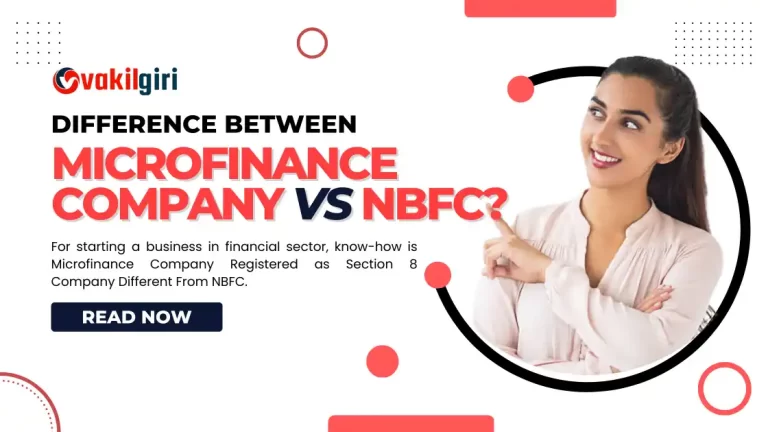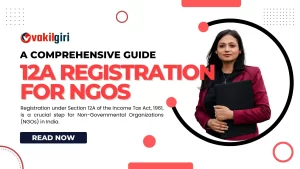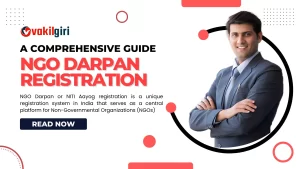Section 8 Microfinance Company Registration & NBFC | Overview
Microfinance companies, as the name implies, are financial entities that give loans to low-income people who have fewer financial needs than other people in society. Traditional financial institutions, such as banks and other financial institutions are often unavailable to these areas.
Microfinance company registration has grown in popularity in recent years and is now widely regarded as an efficient poverty-relieving solution. The majorities of MFIs are well-run and have a good track record, while others are self-sufficient.
In India, there are two types of microfinance companies: one that must be registered with the RBI and the other that that is a non-profit that is registered as a section 8 company and does not require RBI clearance.
Microfinance Section 8 Company Registration
The simplest approach to set up a microfinance company in India is to register as a Section-8 company with the Ministry of Corporate Affairs (MCA). Without levying any additional fees or ensuring security. It has the ability to provide loans at low-interest rates as specified by the RBI and the central government. They are a major contributor to all aspects of rural and agricultural development, including revenue and job generation. Section 8 microfinance company can be established with microfinance objects for social purposes to assist poor people in reducing poverty. Under RBI’s master circular, such businesses are excused from obtaining a license.
Non-Banking Finance Company as a Microfinance Company
A Non-Banking Financial Company (NBFC) is a company incorporated under the Companies Act of 1956 that engages in the lending and advancing of funds, the acquisition of shares/stocks/bonds/debentures/securities issued by the government or a local authority, or other marketable securities of a similar nature, leasing, hire-purchase, insurance, and chit business. The NBFCs play a crucial role in the boosting economy, providing services to both urban and rural areas, and distributing loans to help new businesses expand. These groups also offer a plethora of financial services, such as chit-reserves and advances.
The Reserve Bank of India regulates the functioning of Non-Banking Financial Institutions, hence the microfinance company registration procedures must meet their standards.
Difference between Section 8 Microfinance Company Registration and NBFC:-
| Basis of Difference | Section 8 Microfinance Company | Non-Banking Financial Company |
| RBI APPROVAL | No RBI approval required | RBI approval required |
| NET OWNED FUNDS | No minimum requirement | Minimum 5 crores |
| MINIMUM CAPITAL | No minimum requirement | Minimum of Rs.2 cr |
| COMPLIANCE | Adhere to compliance of RBI, but they are less stringent in comparison to NBFC | It has to adhere to all compliances of an NBFC. |
| REGISTRATION COST | Very low | High cost, Rs. 4 to 5 lakh |
| INTEREST RATE | Same as per RBI guidelines | Same as per RBI guidelines |
| LOAN | Can give an unsecured loan to small businesses, household women, etc. | As defined by RBI |
| MAX LOAN LIMIT | Rs.50,000 for small businesses and Rs.1.25 lakhs for setting up residence dwellings. | There is no such limit as that in Microfinance Section 8 Company. |
| DIRECTOR’S EXPERIENCE | No prior experience required | One director must have experience of more than 10 years in financial services |
| COMPLEXITY | Relatively simple as it is registered as a non-profit organization | All processes involved in forming a company have to be performed. |
| NO. OF MEMBERS | Minimum of 2 members | For a private limited company minimum of 2 For a public limited company minimum of 7 |
| STATUS OF ORGANISATION | NON-PROFIT ORGANISATION | Profit organization |
In order to provide financial credit or loans, Section-8 microfinance companies do not require any securities or collateral. It’s a good alternative for approaching microfinancing firms for quick fundraising because it requires minimal paperwork and is a painless process. They are not only capable of providing emergency credit, but they can also disburse working capital loans, home loans, and company loans with minimal paperwork and processing.
Section 8 microfinance company aid low-income and unemployed people by providing them with simple access to financing. They provide financing for a startup, that is, to an individual who wants to create a firm with a low initial investment and a long-term profit. As a result, it ensures self-sufficiency and entrepreneurship for low-income individuals.
Related More links:
- All You Need to Know About Microfinance Companies
- How to Get Section 8 Microfinance Company Registered?





